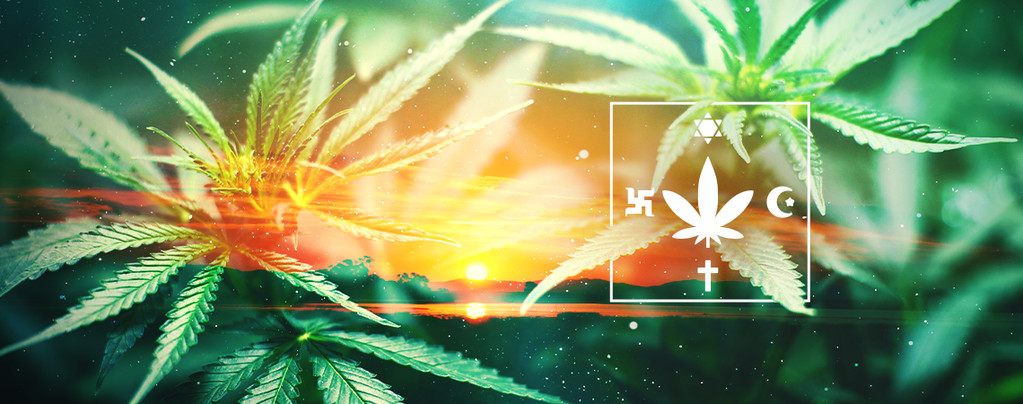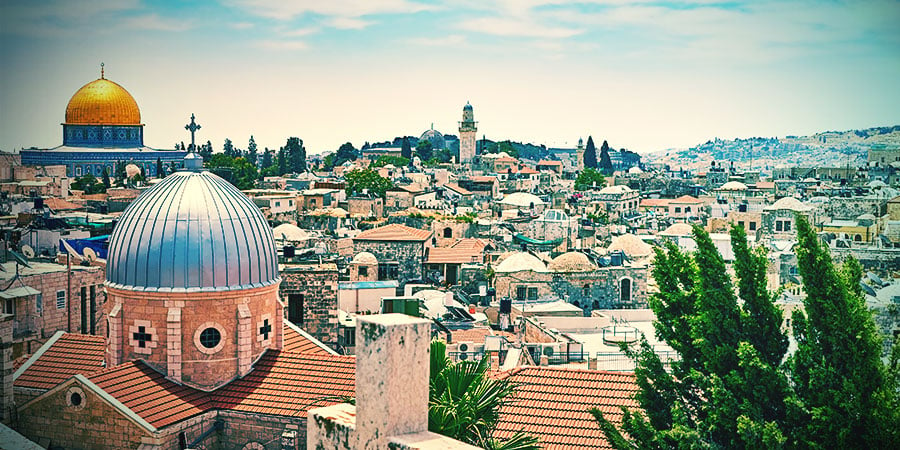
World Religion And Cannabis: A Blessing Or Taboo?
Is cannabis kosher, holy, halal? Let's explore the religious status of this ancient herb.
Cannabis has been used as a sacred herb in many religions for thousands of years. In Ancient Egypt, the goddess Seshat was often depicted with a cannabis leaf above her head. Taoist religious officials used it as a way to commune with spirits and eliminate selfish desires. Rastafarianism has only existed since the 1930s, but holds smoking cannabis as its principal ritual.
Wondering what your religion has to say about cannabis consumption? So are we! We don't claim to be clerics, and can't get into every religious tradition in detail. That said, we've got a curious spirit, solid research skills, and enough time to go over the big ones. Here's the sometimes sacred, sometimes taboo, and oftentimes complex relationship between cannabis and Hinduism, Buddhism, Judaism, Christianity, and Islam.
EASTERN RELIGIONS

HINDUISM
Cannabis has a long and storied history in India. Its medical and religious use may have begun in the region as early as 1000 BCE. It is mentioned in the Atharva Veda, a later addition to the Vedic scriptures of Hinduism. This collection of sacred texts refers to cannabis as a "bringer of freedom", naming it one of the five sacred plants.
Cannabis preparations play an important role in Hindu ritual and culture. Ganja is actually a Hindi word for "compressed female buds". Bhang (from the Sanskrit word for cannabis) is a paste of cannabis leaves and flowers that can be added to food and drink. Bhang is popularly consumed during the Hindu festival of Holi. The drinking of bhang is believed to unite one with the god Shiva, and cleanse the drinker of sins. It is consumed heavily in Mathura, an ancient city considered holy within Hinduism. Bhang is also part of many medicinal preparations in Ayurvedic tradition.
Because of its centuries-long spiritual importance, authorities in India have traditionally turned a blind eye to cannabis consumption. However, that doesn't mean there are no restrictions, even within Hindu tradition. For example, while ritual consumption of bhang is believed to wash away one's sins, foolish drinking of bhang without rites is considered a sin.
BUDDHISM
Buddhism is less strict and directive compared to some other religions. It's more focussed on guiding adherents in their personal spiritual development. That said, there is a code of conduct in Buddhism. It's been compared to the Ten Commandments of the Abrahamic religions. For laypeople, that code is the Five Precepts[2]. Each precept corresponds to an accompanying virtue.
The Fifth Precept is abstention from intoxication, promoting the virtues of mindfulness and responsibility. More specifically, it guides Buddhists to "refrain from intoxicating drinks and drugs which lead to heedlessness". Thus, it stands to reason that cannabis strains free of THC would be permissible. Since CBD and other cannabinoids like CBG are non-intoxicating, they wouldn't cloud the mind. In fact, the anti-anxiety and neuroprotective properties of CBD may promote greater mindfulness, in line with Buddhist principles.
Consumption of THC may even be considered beneficial in some Buddhist traditions. Cannabis is traditionally considered sacred in Tibet. In Tantric Buddhism, which developed in the Himalayas, it's used to facilitate meditation. Likewise, many variants of Buddhism arising in the West have endorsed cannabis as a tool for increasing mindfulness. Thus, whether its effects bring one closer to enlightenment, or cloud the mind, is somewhat dependent on individual experience and tradition. This is keeping in mind that Buddhism, like many world religions, is an ancient and varied practice that spans across broad geographical regions.
WESTERN (ABRAHAMIC) RELIGIONS

JUDAISM
Cannabis' relationship to Judaism is complex and a little unclear. Genesis 1:29 states that God gives "every herb bearing seed" to man. The Talmud also references hemp cultivation, though it talks mainly about clothing rather than psychoactive use. However, there is discussion of medicinal cannabis use in the Jewish tradition. Maimonides, an influential Torah scholar who lived during the Middle Ages, advocated cannabis oil as a treatment for respiratory ailments.
Cannabis use is also widely tolerated among liberal Jewish populations. Even among Orthodox rabbis, opinion on the matter is split. Some have deemed cannabis prohibited; others have stated that medical cannabis is kosher (permitted for consumption). In general, Judaism is more cerebral than other Abrahamic religions. The Jewish concept of prayer is more focussed on self-judgment and contemplation. This has led some to suggest there may be a spiritual role for cannabis consumption, if used to guide self-reflection and enhance awareness.
Like many things that are neither explicitly prohibited nor explicitly encouraged, the status of cannabis within Judaism will likely continue to be debated. For now, the trend seems to lean toward acceptance of cannabis for medical use. Recreational consumption is more of a question mark.
CHRISTIANITY
Despite Jesus' general hippy stoner vibes, the status of cannabis in Christianity is far from clear. Due to shared scripture, Christianity and Judaism share some central points of debate on the matter. The Old Testament, or Hebrew Bible, mentions the plant "kaneh bosm" (קְנֵה-בֹשֶׂם). Kaneh bosm was one of the plants included in holy anointing oil ([8]Exodus 30: 22–25). Most mainstream scholars take this as a reference to the calamus plant. However, others have suggested that's a mistranslation, and kaneh bosm actually refers to cannabis. Some have even hypothesised that cannabis' medicinal properties could explain some of the healing miracles attributed to Jesus Christ.
On the other hand, cannabis consumption has long been discouraged by many Christian churches. The infamous film Reefer Madness was produced by a Christian church group. The Pope has taken a stance against cannabis, and some Protestant churches (mainly Baptist) have discouraged use of medical marijuana. However, other Protestant churches have endorsed cannabis consumption for medical purposes. These include the United, Episcopal, and Methodist churches.
In the debate over medical vs. recreational cannabis consumption, some draw a parallel to the Bible's treatment of alcohol. Aside from being taken sacramentally as the blood of Christ, consumption of "a little wine" is encouraged by the apostle Paul "for the sake of your stomach and your frequent ailments" ([10]1 Timothy 5:23). At the same time, the Bible forbids outright intoxication. Could cannabis fit within this rubric of acceptability? Getting completely baked might be frowned upon. That said, if smoking weed is therapeutic to you, however you define that, there's nothing in the Bible that seems to prohibit it.
ISLAM
There is some debate as to whether cannabis consumption is considered haram (forbidden) or halal (permitted) within Islam. While nothing in the Quran (words of Allah) explicitly prohibits it, it's also not exactly encouraged. The Hadith (words of Mohammed) says that "all intoxicants are prohibited", and many Muslims believe this applies to cannabis. That said, it would not seem to apply to non-intoxicating compounds in cannabis, such as CBD. For that reason, cannabis strains containing no THC may be considered halal.
There's also a possible exception for medical use. The Quran says to care for the body, and health considerations can supersede the general ban on intoxicants under Islam. For example, medical cannabis seeds effectively provide pain medication, which is generally not considered haram, even though many pain meds cause intoxication. Along similar lines, cannabis could be considered acceptable if it's taken on doctor's orders. In fact, Arabic physicians make reference to medicinal cannabis as early as 100 AD. In modern times, Imam Mohammad Elahi has said that smoking marijuana is permissible if it is the "only option in a medical condition prescribed by medical experts".
CANNABIS: SACRED OR PROFANE?

From ancient Assyrians to modern Rastafarians, cannabis has been a sacred plant in traditions spanning millennia. While some world religions are less concerned with its spiritual status, few prohibit it outright. Even those that direct followers to avoid intoxication leave space for medicinal cannabis consumption. It's important to note that no major religion is truly homogeneous in its traditions. Some may have orthodox or conservative traditions that are anti-cannabis, as well as liberal sects that are more open.
Depending on your affiliation, a broad guideline seems to be this: cannabis is okay for therapeutic purposes or to heighten spiritual awareness. Getting stoned out of your gourd for the sake of it might be less of a "religious" experience. We leave it to you and your own traditions to decide.
- (n.d.). BBC - Travel - The intoxicating drug of an Indian god - http://www.bbc.com
- (n.d.). Five Precepts - Encyclopedia of Buddhism - https://encyclopediaofbuddhism.org
- (n.d.). GENESIS 1:29 KJV "And God said, Behold, I have given you every herb bearing seed, which [is] upon the face of all the earth,..." - https://www.kingjamesbibleonline.org
- (n.d.). OU Statement on Kosher Marijuana for Medical Purposes - OU Kosher - https://oukosher.org
- (n.d.). Jesus 'healed using cannabis' | World news | The Guardian - https://www.theguardian.com
- (n.d.). 1 Timothy 5:23 NASB - No longer drink water exclusively, but - Bible Gateway - https://www.biblegateway.com
- (n.d.). Marijuana: Arab Smokers, religious scholars weigh in - https://www.arabamericannews.com
- Contributors to Wikimedia projects. (2005-05-30T07:19:53Z). Holy anointing oil - Wikipedia - https://en.wikipedia.org
- Esther M. Blessing, Maria M. Steenkamp, Jorge Manzanares, & Charles R. Marmar. (2015, October). Cannabidiol as a Potential Treatment for Anxiety Disorders - https://www.ncbi.nlm.nih.gov
- Hind WH, England TJ, & O'Sullivan SE. (2016 Mar). Cannabidiol protects an in vitro model of the blood-brain barrier from oxygen-glucose deprivation via PPARγ and 5-HT1A receptors. - PubMed - NCBI - https://www.ncbi.nlm.nih.gov
- Zuardi, & Antonio Waldo. (2006, June). História da cannabis como medicamento: uma revisão - http://www.scielo.br
-
 2 min
5 November 2017
Psychedelics And Buddhism - Do They Mix?
The use of psychedelic drugs as part of the practice of Buddhism is receiving renewed interest as of late. What is it about this religion and the use of mind-altering drugs that seems so enduringly...
2 min
5 November 2017
Psychedelics And Buddhism - Do They Mix?
The use of psychedelic drugs as part of the practice of Buddhism is receiving renewed interest as of late. What is it about this religion and the use of mind-altering drugs that seems so enduringly...
-
 2 min
29 July 2017
How To Start Your Own Psychedelic Religion
We all know hallucinogens can create an extremely profound and spiritual experience, but have you ever thought of starting up your own religion based on them?
2 min
29 July 2017
How To Start Your Own Psychedelic Religion
We all know hallucinogens can create an extremely profound and spiritual experience, but have you ever thought of starting up your own religion based on them?












 United States
United States










